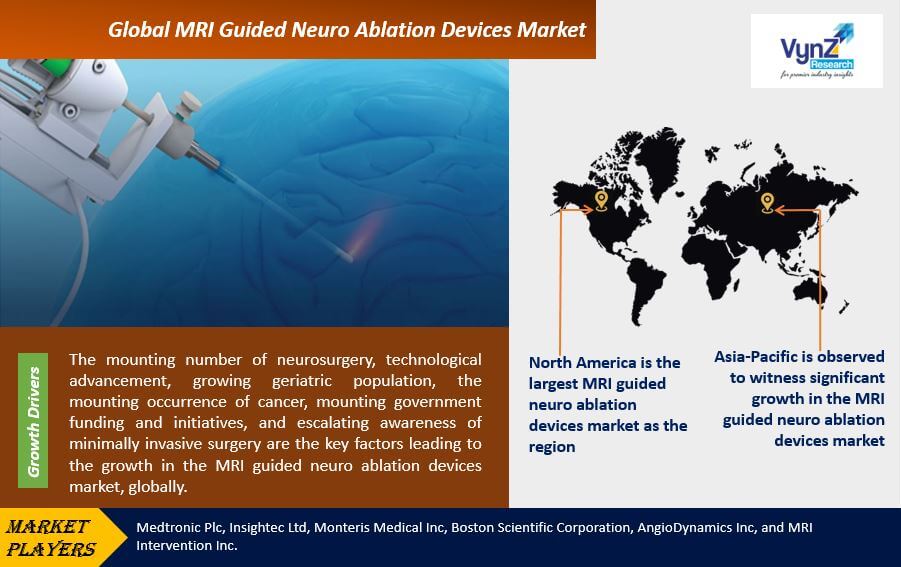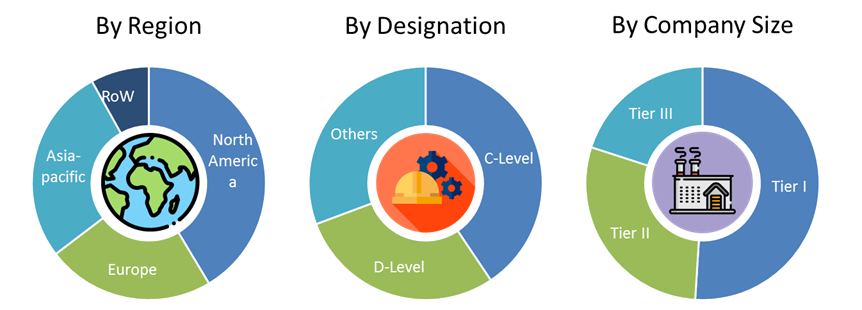| Status : Published | Published On : Dec, 2024 | Report Code : VRHC1073 | Industry : Healthcare | Available Format :

|
Page : 123 |

Global MRI Guided Neuro Ablation Devices Market – Analysis and Forecast (2025-2030)
Industry Insights by Product (MRI Guided RF Ablation System, MRI Guided Focused Ultrasound Systems, MRI Guided Laser Therapy System, and Accessories), and by End User (Hospitals, Ambulatory Surgical Centers (ASCs), and Others), and by Geography (North America, Europe, Asia-Pacific, Middle East, South America and Rest of the World)
Industry Overview
The Global MRI-Guided Neuro Ablation Devices Market is predicted to grow at 5.8% CAGR during the forecast period with the market size reaching USD 1.9 billion by 2030. In 2023 the market was USD 0.45 billion. Different products such as MRI-guided RF ablation systems, MRI-guided focused ultrasound systems, and MRI-guided laser therapy systems are majorly contributing to the MRI-guided neuro ablation devices market size. The market has witnessed significant demand for MRI-guided RF ablation systems over the last few years due to mounting awareness of minimally invasive surgery.

MRI-guided neuro ablation is a minimally invasive neurosurgical technique used for various diseases including a brain tumor. These devices use MRI-guided high-intensity laser probes for the ablation of brain cancer cells. The device is designed for the treatment of majorly brain tumors. The probe used in the system destroys the target cancer cell leaving its neighbor cells unharmed. It is mainly performed thalamus, insula, and basal ganglia of the brain.
MRI Guided Neuro Ablation Devices Market Segmentation
Insight by Product
Based on product, the MRI-guided neuro ablation devices market is categorized into MRI-guided RF ablation systems, MRI-guided focused ultrasound systems, MRI-guided laser therapy systems, and accessories, of which MRI-guided RF ablation system has significant demand in the MRI-guided neuro ablation devices market, globally.
The usage of the system excludes the requirement of an incision, which is essential during the surgical procedure led to the fastest growth of the MRI-guided focused ultrasound systems segment during the historical period, which is also predicted to continue during the forecast period.
Insight by End User
On the basis of the end user, the market is segmented into hospitals, ambulatory surgical centers (ASCs), and others. Of all, the MRI-guided neuro ablation devices market size for ASCs is expected to grow at the fastest rate during the forecast period, globally. In addition, of all end users, hospitals accounted for the largest share of the market, owing to the elevated inclination of the patient to visit hospitals for the management of brain cancer.
Global MRI Guided Neuro Ablation Devices Market Report Coverage
|
Report Metric |
Details |
|
Historical Period |
2018 - 2023 |
|
Base Year Considered |
2024 |
|
Forecast Period |
2025 - 2030 |
|
Market Size in 2024 |
U.S.D. 0.45 Billion |
|
Revenue Forecast in 2030 |
U.S.D. 1.9 Billion |
|
Growth Rate |
5.8% |
|
Segments Covered in the Report |
By Product and By End User |
|
Report Scope |
Market Trends, Drivers, and Restraints; Revenue Estimation and Forecast; Segmentation Analysis; Impact of COVID-19; Companies’ Strategic Developments; Market Share Analysis of Key Players; Company Profiling |
|
Regions Covered in the Report |
North America, Europe, Asia-Pacific, Middle East, South America and Rest of the World |
Industry Dynamics
MRI Guided Neuro Ablation Devices Market Growth Drivers
The mounting number of neurosurgery, technological advancement, growing geriatric population, the mounting occurrence of cancer, mounting government funding and initiatives, and escalating awareness of minimally invasive surgery are the key factors leading to the growth in the MRI-guided neuro ablation devices market, globally.
Owing to the mounting occurrence of brain tumors and cancers has resulted in increased adoption of minimally invasive surgery for the management of the condition. Moreover, escalating healthcare is further increasing the affordability of patients for the treatment. Some of the other key factors driving the growth of the industry are technological advancement, changing lifestyles, and escalating healthcare expenditure.
Continuous advancements in MRI technology, including improved image quality, faster imaging times, and enhanced real-time monitoring capabilities, have made MRI-guided neuro ablation procedures more precise and efficient.
MRI Guided Neuro Ablation Devices Market Challenges
Key factors hindering the growth of the MRI-guided neuro ablation devices market are limited awareness among patients about the treatment of brain tumors in developing countries, high cost, and a limited workforce. In addition, the dearth of skilled professionals is also having a negative impact on the growth of the market.
Medical devices used in MRI-guided neuro ablation procedures must meet strict regulatory requirements and obtain necessary approvals. Obtaining regulatory clearances can be a time-consuming and costly process. Changes in regulatory guidelines or delays in approvals can impact the market entry of new devices or upgrades, slowing down innovation and market growth.
Recent Developments by Key Players
AngioDynamics received FDA clearance for its NanoKnife System to treat prostate tissue ablation. This approval positions NanoKnife as a potential standard treatment for prostate cancer, offering a non-invasive option that preserves surrounding tissues and nerves.
Medtronic continues to integrate artificial intelligence (AI) into its healthcare solutions. The company introduced an intelligent endoscopy system that utilizes AI to analyze images during colonoscopies, aiding in the early detection of colorectal cancer.
MRI Guided Neuro Ablation Devices Market Geographic Overview
Geographically, North America is the largest MRI-guided neuro ablation devices market as the region's geriatric population is increasing and favorable reimbursements policies. In addition, the mounting occurrence of cancer, escalating healthcare expenditure, changing lifestyle, and escalating awareness of minimally invasive surgery are also fueling the growth of the North American MRI-guided neuro ablation devices market.
Asia-Pacific is observed to witness significant growth in the MRI-guided neuro ablation devices market during the forecast period, as the region comprises of a large population and expanding geriatric population. Moreover, mounting the occurrence of cancer, refining healthcare infrastructure, mounting awareness of minimally invasive surgery, and escalating healthcare expenditure are also facilitating the significant growth of the Asia-Pacific MRI-guided neuro ablation devices industry.
MRI Guided Neuro Ablation Devices Market Competitive Insight
Market players in the MRI-guided neuro ablation devices industry are investing capital to develop technologically advanced systems.
AngioDynamics is a global provider of industry-leading medical devices used accross the world for the treatment of cancer and peripheral vascular disease.
Medtronic is a global leader in medical technology, services, and solutions. It is an Irish medical device company. The company's operational and executive headquarters are in Minneapolis, Minnesota, and its legal headquarters are in Ireland.
Some of the key players offering solutions for MRI-guided neuro ablation devices are:
- Medtronic Plc
- Insightec Ltd
- Monteris Medical Inc
- Boston Scientific Corporation
- AngioDynamics Inc
- MRI Intervention Inc.
The MRI Guided Neuro Ablation Devices Market report offers a comprehensive market segmentation analysis along with an estimation for the forecast period 2025–2030.
- By Product
- MRI Guided RF Ablation System
- MRI Guided Focused Ultrasound Systems
- MRI Guided Laser Therapy System
- Accessories
- By End User
- Hospitals
- Ambulatory Surgical Centres
- Others
MRI Guided Neuro Ablation Devices Market by Region
- North America
- U.S.
- Canada
- Mexico
- Europe
- Germany
- U.K.
- France
- Italy
- Spain
- Rest of Europe
- Asia-Pacific
- China
- Japan
- India
- Australia
- Rest of Asia-Pacific
- Rest of the World
- Brazil
- South Africa
- Saudi Arabia
- U.A.E
- Other countries
PRIMARY RESEARCH INTERVIEWS - BREAKDOWN

Frequently Asked Questions
Purchase Options
Latest Report
Research Methodology
- Desk Research / Pilot Interviews
- Build Market Size Model
- Research and Analysis
- Final Deliverabvle
Connect With Our Sales Team
- Toll-Free: 1 888 253 3960
- Phone: +91 9960 288 381
- Email: enquiry@vynzresearch.com
MRI Guided Neuro Ablation Devices Market
